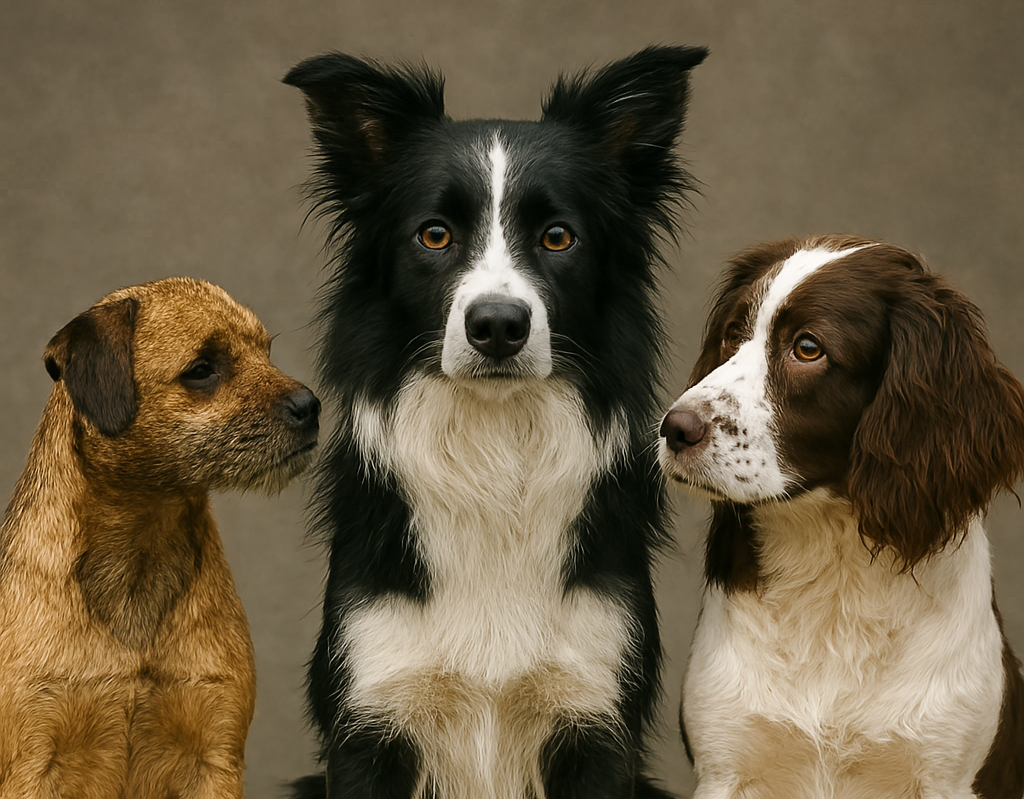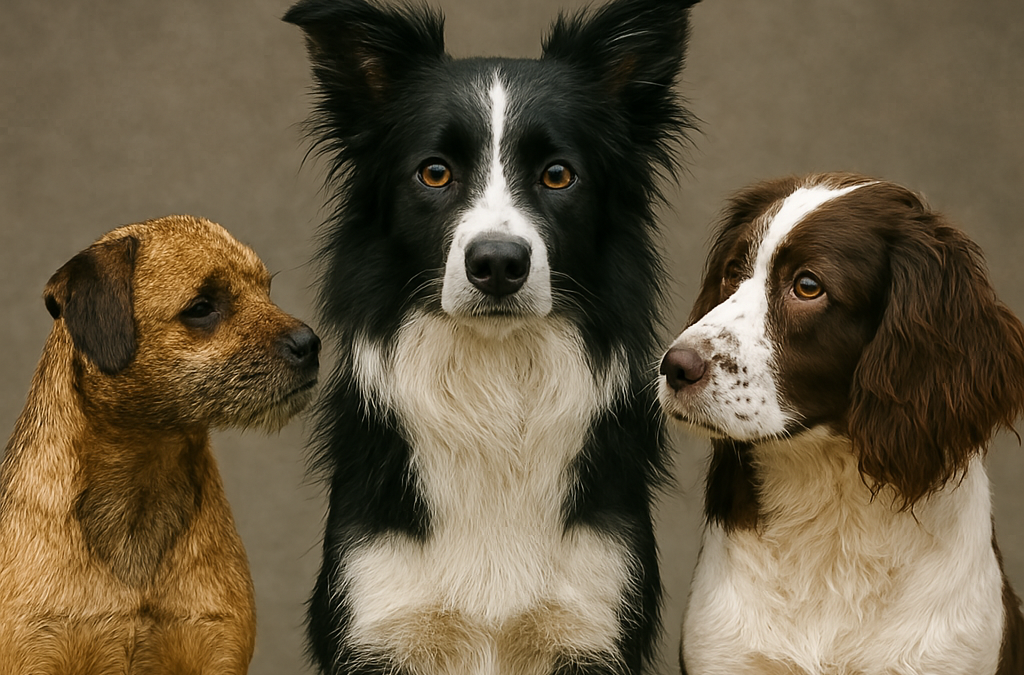
Genetic Fulfilment in Dogs
Different dogs have different needs. Why? Well, let’s put it like this: What was your breed of dog brought into existence to do when it was created? That might have been 100 years ago, it might have been 1000 years ago. But, with the exception of a small handful of breeds, every dog breed was originally bred to be good at a task, to fulfil a function – they are WORKING animals. And if you want your dog to live its best life a good place to start is to give it some work to do which plays into its historical purpose. Or as we call it in dog training, “genetic fulfilment”.
Genetic Fulfilment in Dogs: Understanding and Honouring Breed-Specific Needs
Dogs have been humankind’s companions for thousands of years, selectively bred to perform specific tasks. Whether herding livestock, guarding property, retrieving game birds, or simply providing companionship, each breed carries a genetic legacy that shapes not just its appearance, but its instincts, drives, and behaviours. The concept of genetic fulfilment in dogs revolves around recognizing and meeting these inherited needs—ensuring dogs are not only physically healthy but also psychologically and emotionally satisfied.
What is Genetic Fulfilment?
Genetic fulfilment refers to the satisfaction of a dog’s innate drives and instincts that are hardwired into its DNA through selective breeding. Just as border collies are wired to herd and golden retrievers to retrieve, many behaviours seen in dogs today are not random—they are purposeful expressions of their genetic heritage.
When these needs are met, dogs tend to be happier, more balanced, and better behaved. When ignored, dogs may exhibit frustration, anxiety, or behavioural issues. Understanding genetic fulfilment helps dog owners provide a more enriching life tailored to their individual dog’s purpose.
Why It Matters
Many behavioural problems in dogs stem not from poor training, but from unmet instinctual needs. A working-line Belgian Malinois kept in a small apartment with no outlet for its energy and drive is likely to develop destructive habits. Likewise, a beagle deprived of the opportunity to sniff and follow scents may become vocal or restless.
Meeting genetic needs isn’t about making a dog “work” in the traditional sense. It’s about finding modern ways to simulate the activities their breed was developed for. This promotes mental stimulation, reduces stress, and helps dogs live more fulfilled lives.
Examples of Breed-Specific Fulfilment
- Border Collies (Herding Group)
Border Collies are famously intelligent and possess an intense drive to herd. These dogs need not just exercise but also mental stimulation and the chance to problem-solve. Activities like agility, obedience, scent work, or even controlled herding can help meet their genetic needs. - Labrador Retrievers (Sporting Group)
Bred to retrieve game, particularly from water, Labradors love to carry things in their mouths, swim, and engage with people. Fetch games, dock diving, or field trials can help satisfy their retrieving instinct. - Beagles (Hound Group)
Beagles were bred to track scents over long distances. Their sense of smell is among the most acute in the canine world. They thrive when allowed to use their noses—scent games, nose work, or allowing them to explore different environments can provide this. - German Shepherds (Working Group)
These dogs were bred for herding and later for protection, police, and military work. They have strong protective instincts, high intelligence, and loyalty. Obedience training, tracking, and protection sports like PSA offer ideal outlets. - Terriers (Terrier Group)
Bred to chase and kill vermin, terriers are bold, energetic, and love to dig or chase small animals. They benefit from digging to retrieve toys, playing tug and chasing games that mimic their hunting behaviours. - Sighthounds (e.g., Greyhounds, Whippets)
These dogs were bred to chase prey using their incredible speed and eyesight. They may enjoy lure coursing, playing with a flirt pole, or simply the chance to run freely in a safe area.
Meeting Genetic Needs in a Modern World
Not everyone has access to sheep for herding or game birds for retrieving, but that doesn’t mean dogs can’t experience genetic fulfilment. The key is creative simulation—finding modern equivalents that engage the same instincts.
- Scent Work: Great for hounds, spaniels, and even mixed breeds. Hide treats or toys and let the dog sniff them out.
- Problem Solving Games: Challenge working breeds mentally.
- Fetch and Retrieval Games: Ideal for retrievers and other sporting breeds.
- Agility & Obedience Sports: Beneficial for herding and working dogs.
- Digging Boxes: A sandbox filled with toys can satisfy terriers’ digging needs.
- Flirt Poles or Lure Coursing: Simulates chasing prey for sighthounds and terriers.
Even daily routines like walks can be enhanced with “sniff breaks,” allowing dogs to explore their environment through scent—fulfilling both their curiosity and their instinctual need to investigate.
The Role of Enrichment
While physical exercise is vital, mental and emotional enrichment are equally important. Bored dogs, particularly those with high mental energy, can become anxious or destructive. Enrichment activities should engage a dog’s senses, mind, and body.
Here are some enrichment categories:
- Cognitive Enrichment: Training sessions, new tricks, or food puzzles.
- Environmental Enrichment: New places to walk, different surfaces to explore.
- Social Enrichment: Time with humans or other dogs, if they enjoy company.
Mixed Breeds and Genetic Fulfilment
Mixed breed dogs also benefit from genetic fulfilment. While their ancestry might be diverse, paying attention to dominant physical and behavioural traits can give clues to what kind of enrichment they might enjoy. We as owners need to try different types of enrichment to see what stimulates and rewards our dogs the most.
Consequences of Genetic Frustration
When dogs are denied the opportunity to express their natural instincts, it can lead to a range of issues:
- Destructive chewing or digging
- Barking or howling
- Escape behaviour
- Hyperactivity or restlessness
- Aggression or anxiety
Often, these are not signs of a “bad dog,” but a bored or frustrated one. Addressing the root cause by offering meaningful outlets can transform a dog’s behaviour.
The Human-Dog Partnership
Honouring a dog’s genetic makeup strengthens the bond between human and dog. It builds trust, satisfies the dog’s core needs, and results in a happier, more cooperative companion. For the owner, it brings a deeper understanding of their pet’s behaviour and motivations.
Rather than suppressing unwanted instincts, channelling them in constructive ways is the goal. A terrier allowed to chase toys is less likely to chase squirrels. A border collie working through an agility course is less likely to herd children. What’s more, practicing these skills while incorporating impulse control can effective add an “on/off” switch to the behaviour.
Conclusion
Genetic fulfilment is about respect—respecting the incredible biological history each dog carries and providing a life that allows those instincts to be expressed in safe, enriching ways. Whether a dog lives on a farm, in a suburb, or a city apartment, understanding and meeting their genetic needs is not just beneficial—it’s essential for their wellbeing.
By embracing each breed’s legacy and building activities around it, dog owners can unlock the true potential of their companions and ensure a life of joy, purpose, and balance for their four-legged friends.

